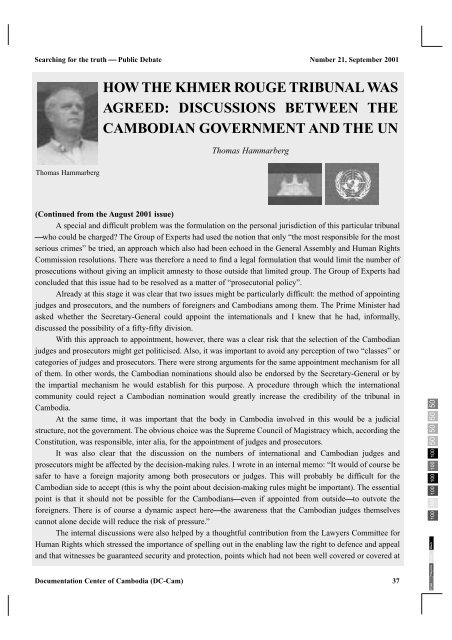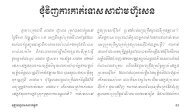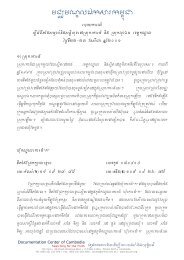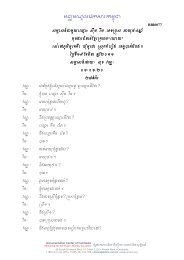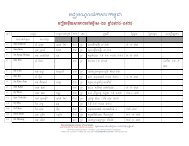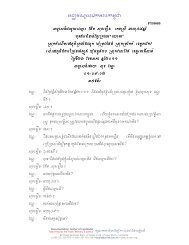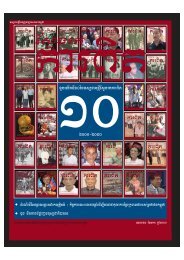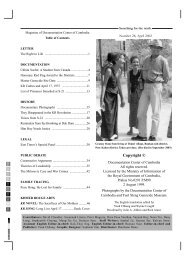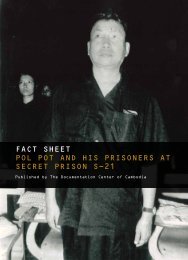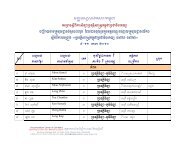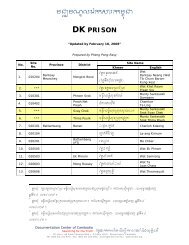Searching for the truth Issues 21 - Documentation Center of Cambodia
Searching for the truth Issues 21 - Documentation Center of Cambodia
Searching for the truth Issues 21 - Documentation Center of Cambodia
You also want an ePaper? Increase the reach of your titles
YUMPU automatically turns print PDFs into web optimized ePapers that Google loves.
<strong>Searching</strong> <strong>for</strong> <strong>the</strong> <strong>truth</strong> ⎯ Public Debate<br />
Thomas Hammarberg<br />
<strong>Documentation</strong> <strong>Center</strong> <strong>of</strong> <strong>Cambodia</strong> (DC-Cam)<br />
Number <strong>21</strong>, September 2001<br />
HOW THE KHMER ROUGE TRIBUNAL WAS<br />
AGREED: DISCUSSIONS BETWEEN THE<br />
CAMBODIAN GOVERNMENT AND THE UN<br />
Thomas Hammarberg<br />
(Continued from <strong>the</strong> August 2001 issue)<br />
A special and difficult problem was <strong>the</strong> <strong>for</strong>mulation on <strong>the</strong> personal jurisdiction <strong>of</strong> this particular tribunal<br />
⎯who could be charged? The Group <strong>of</strong> Experts had used <strong>the</strong> notion that only “<strong>the</strong> most responsible <strong>for</strong> <strong>the</strong> most<br />
serious crimes” be tried, an approach which also had been echoed in <strong>the</strong> General Assembly and Human Rights<br />
Commission resolutions. There was <strong>the</strong>re<strong>for</strong>e a need to find a legal <strong>for</strong>mulation that would limit <strong>the</strong> number <strong>of</strong><br />
prosecutions without giving an implicit amnesty to those outside that limited group. The Group <strong>of</strong> Experts had<br />
concluded that this issue had to be resolved as a matter <strong>of</strong> “prosecutorial policy”.<br />
Already at this stage it was clear that two issues might be particularly difficult: <strong>the</strong> method <strong>of</strong> appointing<br />
judges and prosecutors, and <strong>the</strong> numbers <strong>of</strong> <strong>for</strong>eigners and <strong>Cambodia</strong>ns among <strong>the</strong>m. The Prime Minister had<br />
asked whe<strong>the</strong>r <strong>the</strong> Secretary-General could appoint <strong>the</strong> internationals and I knew that he had, in<strong>for</strong>mally,<br />
discussed <strong>the</strong> possibility <strong>of</strong> a fifty-fifty division.<br />
With this approach to appointment, however, <strong>the</strong>re was a clear risk that <strong>the</strong> selection <strong>of</strong> <strong>the</strong> <strong>Cambodia</strong>n<br />
judges and prosecutors might get politicised. Also, it was important to avoid any perception <strong>of</strong> two “classes” or<br />
categories <strong>of</strong> judges and prosecutors. There were strong arguments <strong>for</strong> <strong>the</strong> same appointment mechanism <strong>for</strong> all<br />
<strong>of</strong> <strong>the</strong>m. In o<strong>the</strong>r words, <strong>the</strong> <strong>Cambodia</strong>n nominations should also be endorsed by <strong>the</strong> Secretary-General or by<br />
<strong>the</strong> impartial mechanism he would establish <strong>for</strong> this purpose. A procedure through which <strong>the</strong> international<br />
community could reject a <strong>Cambodia</strong>n nomination would greatly increase <strong>the</strong> credibility <strong>of</strong> <strong>the</strong> tribunal in<br />
<strong>Cambodia</strong>.<br />
At <strong>the</strong> same time, it was important that <strong>the</strong> body in <strong>Cambodia</strong> involved in this would be a judicial<br />
structure, not <strong>the</strong> government. The obvious choice was <strong>the</strong> Supreme Council <strong>of</strong> Magistracy which, according <strong>the</strong><br />
Constitution, was responsible, inter alia, <strong>for</strong> <strong>the</strong> appointment <strong>of</strong> judges and prosecutors.<br />
It was also clear that <strong>the</strong> discussion on <strong>the</strong> numbers <strong>of</strong> international and <strong>Cambodia</strong>n judges and<br />
prosecutors might be affected by <strong>the</strong> decision-making rules. I wrote in an internal memo: “It would <strong>of</strong> course be<br />
safer to have a <strong>for</strong>eign majority among both prosecutors or judges. This will probably be difficult <strong>for</strong> <strong>the</strong><br />
<strong>Cambodia</strong>n side to accept (this is why <strong>the</strong> point about decision-making rules might be important). The essential<br />
point is that it should not be possible <strong>for</strong> <strong>the</strong> <strong>Cambodia</strong>ns⎯even if appointed from outside⎯to outvote <strong>the</strong><br />
<strong>for</strong>eigners. There is <strong>of</strong> course a dynamic aspect here⎯<strong>the</strong> awareness that <strong>the</strong> <strong>Cambodia</strong>n judges <strong>the</strong>mselves<br />
cannot alone decide will reduce <strong>the</strong> risk <strong>of</strong> pressure.”<br />
The internal discussions were also helped by a thoughtful contribution from <strong>the</strong> Lawyers Committee <strong>for</strong><br />
Human Rights which stressed <strong>the</strong> importance <strong>of</strong> spelling out in <strong>the</strong> enabling law <strong>the</strong> right to defence and appeal<br />
and that witnesses be guaranteed security and protection, points which had not been well covered or covered at<br />
37<br />
100 100 100 100 100 100 50 50 50 50<br />
Black<br />
Yellow<br />
Magenta<br />
Cyan


